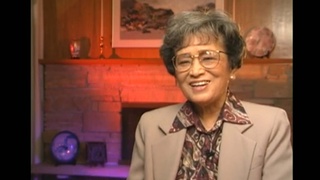Interviews
Apologies from the JACL
They were surprised that, uh, some of the big shots, the head people of the JACL, was in, cooperating with the FBI, the national intelligence, naval intelligence, army intelligence, and cooperating with them and giving them information about leaders of the Japanese communities and, uh, who to pick up and things like that, I guess. And, uh, a lot of dirt came out. And, at the next convention after her report was in, Cressey Nakagawa was the President, and they condensed it to, from a ninety-one page report to a twenty-six page thing that had no likelihood, no inkling, with the original report. So, in the meantime, after that, they uh, got the original report. I don’t know who got it where, but, it was, uh, made into a [inaudible] report and they made copies of it and began circle it here and there. The real report. I guess through that, they uh, later came out to, uh, apologize to the resisters for the actions that they took during the war.
Date: May 9, 2006
Location: California, US
Interviewer: Lisa Itagaki
Contributed by: Watase Media Arts Center, Japanese American National Museum







